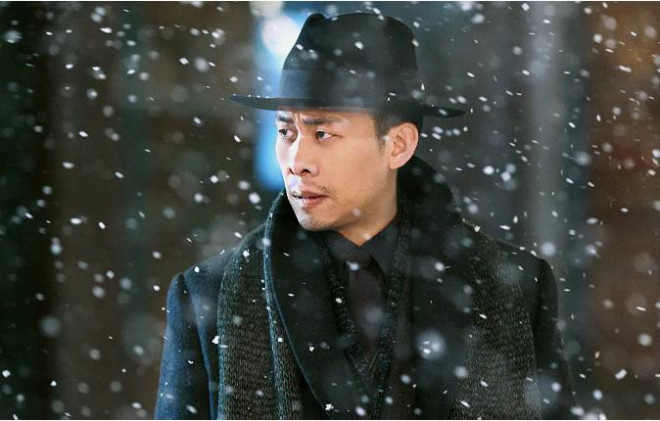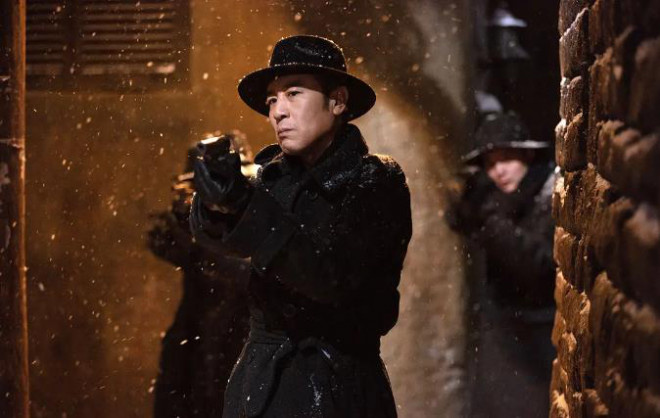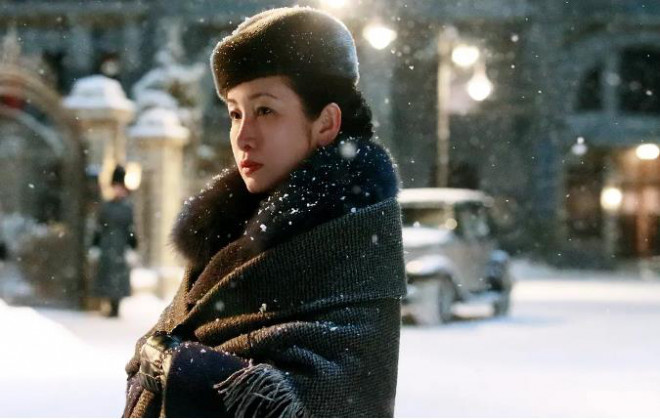Above the Cliff: The domestic spy war film "boutique" still needs to be polished.
Original title: Domestic spy war film "Boutique" still needs to be polished.

The director’s new spy war film has been highly praised since its release. According to the cat’s eye data, the film won 46.823 million box office on the first day of release, exceeded 200 million on the second day, and the douban score remained at 7.7 points, ranking first in the "May 1st" film. Above the Cliff can achieve such excellent results. It is very important that it shows the new style of domestic spy film creation, especially in audio-visual language.
The film creates a tense and bleak atmosphere with oil-painting colors and unique sound effects. In the opening shot of the film, the brushwork technique similar to Russian classical oil painting shows the magnificent scenery of the north to the fullest. Russian painters often use strong tone contrast to express natural scenery, wash and practice with pens, and create a unique space atmosphere. The use of sound effects perfectly laid the overall tone for the film. When four underground party member parachuted into the snow, the friction between clothes and snow was particularly harsh in the empty and lonely mountain forest. Combined with the restrained facial expressions of the actors, the inner pressure and fear of the characters were amplified, which also made the audience feel anxious.
In addition, the creator also creates characters through light and shadow and scenery, which makes them have a certain sense of sculpture. For example, in the scene of Zhou Yi chasing Chu Liang, Zhou Yi leans against the wall, and the background is dark. The light source on the right side hits him, and the strong light and shadow outline the figure’s face, body outline and clothes texture. He leaned against the wall motionless, his eyes focused, and the whole person was like a sculpture. The shadow of the brim forms an oblique shadow on his face, which divides the side face of the character in half. This cutting method implies the complex identity of Zhou Yi in extreme environment.
The irregular composition in the film creatively combines the classic elements of foreign films such as street fighting, chasing and crashing. For example, when the underground party was chased by the enemy, the director used a panoramic view to shoot, and the characters fled in crowded, closed and chaotic residential alleys. The large building walls formed a sense of oppression on the characters, which was the externalization of the power contrast between the two sides and the embodiment of the psychological pressure of the characters themselves. The audience also produced a kind of extreme fear, anxiety and depression.

Undoubtedly, the audio-visual language of Above the Cliff is exquisite and unique, and it is not an exaggeration to call it an audio-visual feast. But unfortunately, it is still slightly thin in narrative, especially compared with domestic spy war TV series.
First of all, spy war TV plays pay attention to the ethical basis and emotional expression of creation. Vow Silence, Latency, The Right Way in the World is Vicissitudes, Cliff and Kite, which are highly praised by the audience, all sew the elements of spy war into the family narrative. In each "special" family, members have different social backgrounds, political positions and complex emotional entanglements. For example, Yang Liren and Yang Liqing, two brothers in the TV series "The Right Way on Earth is Vicissitudes", are both brothers and political enemies, one is the Kuomintang and the other is communist party. The two men not only retained the frankness between brothers, but also had the vigilance and preparedness between political enemies. At the same time, everyone’s ending is inseparable from the historical trend. This is also a continuation of the traditional narrative mode of "integration of family and country", which fits the audience’s psychology of watching movies.
The movie "On the Cliff" also tries to integrate the family and the country into the spy war narrative, so it designs the scene of Zhang Xianchen and Wang Yu looking for their children. However, the two clues are in a free state, and it is difficult for the audience to "empathize".
Secondly, spy TV plays attach importance to the polishing of the text, with meticulous plot logic and delicate suspense delay. The TV series "Latent" is good at making use of the casual words of little people to become an important incision for the protagonist to reverse, and this important information is often interrupted by another important plot point. This interlocking narrative way makes the audience dare not slack off. The spy film The Wind attaches importance to the rigor of logic, and it adopts a unique closed space narrative, learns from the game of "Wolf Man Killing" and integrates elements of western game theory, all of which enhance the audience’s sense of participation in discrimination and analysis. The stunning reversal of the role identity has prompted the audience to ponder every detail carefully.
In contrast, Above the Cliff lacks flipping, and the protagonist Zhou Yi is too upright. As soon as he appears, the audience can already guess his true identity, and the sense of suspense is weakened, which can’t perfectly release the charm of spy war works.
Furthermore, the spy war TV series also maximizes the tension of the story by showing the disparity between the enemy and ourselves. The TV series "Cliff" created Gao Bin, a treacherous and meticulous spy leader. He trusted Zhou Yi on the surface, but in fact he secretly designed it many times to kill Zhou Yi. Zhou Yi’s repeated self-help not only shows his shrewdness and wisdom, but also shows the cruelty of his struggle against the enemy incisively and vividly. Even some villains in the play can’t be ignored, such as special agents Lu Ming and Liu Kui, who are skilled and loyal, not only don’t leave any chance for Zhou Yi, but also have to be on tenterhooks all the time and dare not make any mistakes.

At this point, the plot setting and character relationship of Above the Cliff are slightly simple. Although Gao Bin is sinister and cruel, it is not enough to compete with Zhou Yi, thus weakening the narrative tension of the story. In addition, the portrayal of villains is too faceless and low-energy. For example, Jin Zhide, a supporting role, appears to be full of rage and lack of wisdom.
It is worth mentioning that both the films Wind and Above the Cliff are trying to create group images, which requires the works to be more comprehensive and meticulous in depicting characters. The characters in the movie "Wind" have distinct personalities, and are feminine and biting "sissy" Bai Xiaonian; Gu Xiaomeng, who is graceful and enchanting but has a deep mind; Li Ningyu, who is gentle, cool and arrogant, and Wang Zhiguo, who is serious and deep, have unique personality-driven behaviors to create impressive characters. However, the four main characters in Above the Cliff are not distinctive enough, especially Xiaolan. The creator lacks a deep description of her personality and professional ability, and it is difficult to convince the audience that she is a qualified spy.
Group drama also requires that each character should have a solid plot line, but Above the Cliff has obvious character line fracture. The main character Xiaolan’s character line is obviously weaker than the other three, which undoubtedly lacks the necessary driving force for the development of the core plot.
Undoubtedly, On the One hand, On the Cliff, with its unique audio-visual performance, we can see the progress of China’s spy war movies, and stylized spy war movies are on the way. In order to make a better domestic spy film, the creator should not only polish the audio-visual techniques carefully, but also base himself on the story, and combine the real beauty with the artistic beauty with solid narrative logic, delicate suspense settings and real and full human images. Only in this way can the audience’s emotions be summoned and the core beliefs be effectively conveyed. (Author: Jiang Muyang, Ph.D. student of film science in 2020 in China Academy of Art)